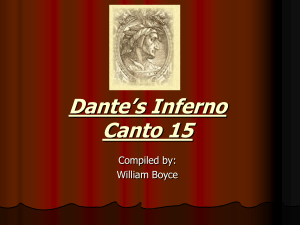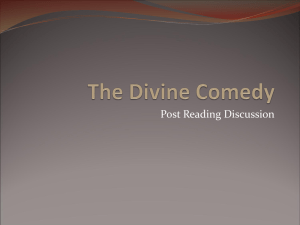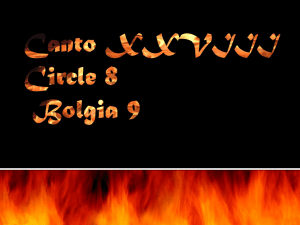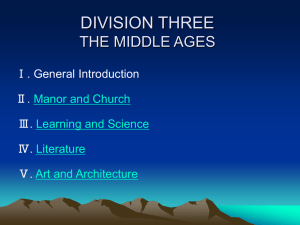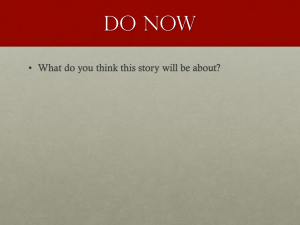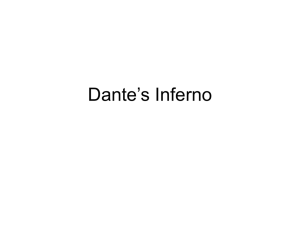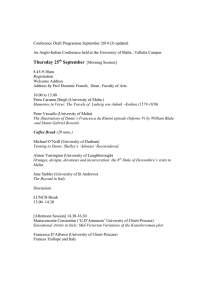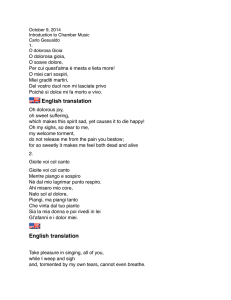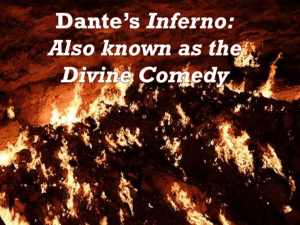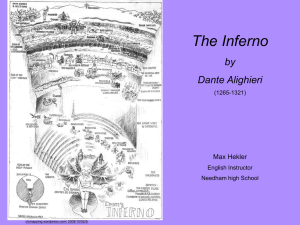Canto 5, 33, and 34 - Chicago High School for Agricultural Sciences
advertisement
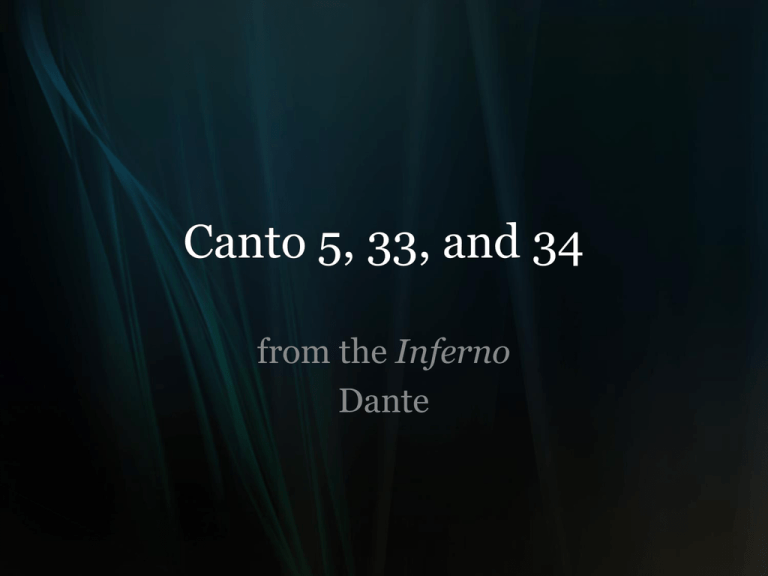
Canto 5, 33, and 34 from the Inferno Dante Canto 5: The Carnal • Remember this: everything is created by the Christian God in the Inferno. • In medieval Christian theology, Limbo is located at the outer edge of Hell for souls that are neither condemned or saved. This includes anyone (including children) who have not been baptized, as well as the righteous who have lived and died before the birth of Christ. Canto 5: The Carnal • Dante employs the law of symbolic retribution in Canto 5; just as their judgment was swept away by their tempestuous passions, the carnal sinners are whirled around in a hellish storm. Canto 5: The Carnal • The Minos’s warning of “Do not be misled by that wide and easy passage!” parallels a famous passage in the New Testatment: “Wide is the gate, and broad is the way, that leadeth to destruction, and many there be that go in thereat: Because straight is the gate, and narrow is the way, which leadeth unto life, and few there be that find it” (Matthew 7:13-14) Canto 5: The Carnal • Dante creates the tempestuous mood for Canto 5 by using verbs such as “roaring,” “wracked,” “sweeps,” “whirling,” “battering,” and “drives” when describing the whirlwind of the circle. • Dante compares the condemned souls to cranes crying harshly as they fly overhead (simile) which also contributes to the mood. Canto 5: The Carnal • The characters presented in Canto 5 are figures from legend and literature and are known for their sins of sexual passion: • Semiramis, legendary queen of Assyria • Dido, legendary queen of Carthage who vows to be true to her husband, Sichaeus, but breaks this vow when she falls in love with Aeneas. When he leaves, she commits suicide by throwing herself on a funeral pyre. Canto 5: The Carnal • Achilles, a legendary Greek Warrior who deserts his army in order to marry Polyxena. • Tristan, who feel in love with Iseult, a young princess betrothed to his uncle, King Mark of Cromwell, according to medieval legend. • Paolo and Francesca, who were murdered by her husband, Giovanni (who was Paolo's brother) when he found the two lovers together. Canto 5: The Carnal • Dante feels pity and confusion for the "great knights and ladies," but chooses to speak to Paolo and Francesca; he compares them to mating doves that are called to their nest (simile). • Murderer Giovanni Malatesta, the husband of Francesca and brother of Paolo, was still living at the time of Dante's work; his place in Circle 9 is far worse than that of the latter. Canto 5: The Carnal • The story that Paolo and Francesca read is that of Lancelot and Guinevere. According to the medieval legend of King Arthur, Lancelot falls in love with Guinevere, Arthur's queen, which leads to the downfall of the Knights of the Round Table. The book acts as a "pander," or go between for the lovers. Canto 33: Fraud and Treachery • The geography of Dante's Hell is precisely worked out. Dante conceived the whole realm as a endless and tapering pit, with its bottom at the center of the earth. Dante and Virgil descend through nine circles, each with increasing punishment. Canto 33: Fraud and Treachery The nine circles are groups into threes, corresponding to the three kinds of vice that Dante learned from Aristotle: incontinence (the Wolf), violence (the Lion), and fraud and malice (the Leopard). Canto 33: Fraud and Treachery • The ninth circle, Cocytus (a river in the Greek underworld which means "river of wailing") is reserved for sins of fraud and treachery. The rounds are dedicated to a specific type of sin (Antenora, treachery towards country, and Ptolomea, treachery towards guests and hosts). Antenora • Named for Antenor who betrayed Troy to the Greeks (in some versions). • Count Ugolino and Archbishop Ruggieri are in the Round for treason: they once plotted together, and Ruggieri betrayed his fellow-plotter and caused his death by starvation along with his four “sons.” His sons offer their father themselves as food. Antenora • In Dante’s world of symbolic retribution, Ruggieri becomes food for Ugolino, who gnaws on his head. • However, when Ugolino refers to Ruggieri with “reverend grace,” it is in an ironic tone, being that he is a brutal man who deserves none. Antenora • Ugolino’s sons are actually grown men and the younger grandson is fifteen; for effect, Dante makes them much younger. • The Canto brings forth the concept of fairness: is Ugolino’s revenge justified? • Ugolino has betrayed Pisa by giving up castles during a war, and for this, he is punished. Dante also blames Pisa for allowing his children to die. Ptolomea • At this point, Dante is numb from witnessing the horrors of Hell. • He is also confused as to the source of the wind. • Hell is not warm and full of light from fire: it is a “frozen mine” (metaphor). • The round is named for Ptolomeus, who invited Simon Maccabaeus, king of Judea, and his two sons to a banquet and then murdered them. Ptolomea • Those condemned to this round lie with only half their faces above the ice and their tears freeze in their eye sockets, sealing them with little crystal visors. Thus, the comfort of tears is taken away from them. • So great is the sin of Friar Alberigo and Branca d’Oria that their souls fall to its torments even before they die, leaving their body still on earth, inhabited by demons. Ptolomea • To avenge an insult, Friar Alberigo invited his brother Manfred and his son to dinner. At the signal “bring the fruit,” murderers killed Manfred and son. • Dante promises the Friar that he will relieve his punishment if he will tell his story; however, he breaks it, because then he will not suffer to the full extent. Ptolomea • Branca d’Oria invited his father-in-law to a feast, Michel Zanche, and then murdered him. • In this Round, Dante introduces the idea the demons (and Satan) can live on earth through living souls. Canto 34: Cocytus, Judecca, and The Center • Cocytus, Compound Fraud • Judecca, Treachery towards their Master (named for Judas Iscariot) • The Center, Satan Canto 34 • The icy wind comes from the beating of Satan’s wings. This is allegorical: Satan is the source of all evil, as well as the sufferings of Hell. • Hell is a macabre distortion of Heaven, much like evil is a distortion of good. Those that are evil, at best, can only mimic, or imitate, those who are good. Canto 34 • Dante at this point is in a state of paradox: he is alive, being that he is observing Hell as a living soul, but also dead, being that he is having trouble breathing due to fright. • Being frozen in ice, Dante illustrates that Satan’s power is limited: he is an enemy of God, but not his equal. He is God’s creation. Canto 34 • Dante compares Satan’s wings to “a sail” and wings of “a gross bird.” Gross means large, but also disgusting. • Satan’s weeping suggests that though he is king over all sinners, he is also the most unhappy. The beating of his wings implies a desire to escape his own realm. Though he tortures damned souls, he himself is tortured. Canto 34 • Brutus, Cassius, and Judas Iscariot are gnawed on by Satan in a disgusting distortion of the Holy Trinity (Father, Son, Holy Spirit). • Judas is in the center of Satan’s mouth, being that he betrayed Christ, and is looked upon as the worst sinner of all. • Brutus and Cassius killed Julius Caesar at the height of the Roman Empire: with this, Dante makes it clear church and state are of the same level of importance. Brutus and Cassius • Placed feet first into Satan’s mouth to be eaten eternally. • Have black and whitish-yellow faces, respectively. • Punished for the assassination of Julius Caesar: Dante found that his death hindered God’s plan for human happiness through the empire of Rome. Brutus and Cassius • Both Brutus and Cassius fought on the side of Pompey in the civil war. • Following Pompey's defeat at Pharsalia in 48 B.C.E., Caesar pardoned them and invested them with high civic offices. Brutus and Cassius • Still, Cassius continued to harbor resentment against Caesar's dictatorship and enlisted the aid of Brutus in a conspiracy to kill Caesar and re-establish the republic. • Though they succeeded at assassinating Caesar, their political ambitions were destroyed by Octavian and Antony at Philippi . Brutus and Cassius • Cassius, defeated by Antony and falsely thinking that Brutus had been defeated by Octavian, had himself killed by a servant; Brutus indeed lost a subsequent battle and took his life as well. • Dante felt that their betrayal of their benefactor and supreme ruler of the secular world was one of the worst sins of all: disloyalty to the state. Judas Iscariot • One of the twelve disciples of Christ • Judas strikes a deal to betray Jesus for thirty-pieces of silver. • His treachery is foreseen by Jesus at the Last Supper, which makes Judas’s sin even more treacherous. • He identifies Jesus to the authorities with a kiss. Judas Iscariot • Judas later regrets his transgression, turns over the thirty-pieces of silver, and hangs himself. • Suffering even more than Brutus and Cassius, Dante's Judas is placed head-first inside Lucifer's central mouth, with his back skinned by Satan’s claws. • Judas is seen as the second worst traitor of all, next to Satan himself. Satan • Lucifer means “light bearer.” God intended for Lucifer (Satan) to be his utmost angel. • His corruption begins in the Garden of Eden. • All the rivers of Hell flow back and from Satan: he is the source of all evil. • As Virgil and Dante descend from Hell, they see the light of God, not God, which brings them hope. Writing Prompt 12/3/10 200 word minimum Based on the notion of symbolic retribution, does Dante create a Hell that is just? Or, are there punishments that do not fit the crime? Be specific.
